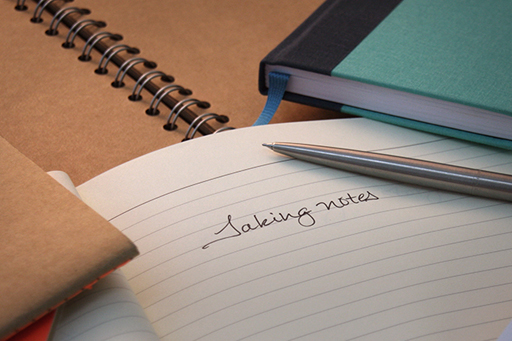4.1 Why take notes and what to note

By now you should have quite a few things in your writer’s notebook, besides the set writing tasks you have undertaken. Your notebook should be a repository for what you collect.
Alongside some of the activities included in this course, your journal might include:
- general notes and sensory observations of the world around you
- things you have seen or heard, felt or read – perhaps passages of other people’s writing, or turns of phrase that you admire
- words and word-derivations that are new or interesting to you
- facts that you want to remember
- lines or phrases that you might use in your work
- images: postcards, pictures, photographs that are in some way significant to you, perhaps because they conjure up a scene or story that you might write about
- descriptions or sketches of characters and places you might wish to write about
- notes about periods in recent or distant history that you are interested in
- ideas and plot lines that might be useful in future, or that you are gathering for particular pieces of work.
A single line noted down can prove to be the basis for an entire story or even a novel.
Describing her writer’s journal, the American writer Joyce Carol Oates says:
It resembles a sort of ongoing letter to myself, mainly about literary matters. What interests me in the process of my own experience is the wide range of my feeling. … after I finish a novel I tend to think of the experience of having written it as being largely pleasant and challenging. But … the experience is various: I do suffer temporary bouts of frustration and inertia and depression. There are pages in recent novels that I’ve rewritten as many as seventeen times.
Over time, a writer’s notebook can act as an anchor to remind you how certain ideas originated, and where you initially meant to take them. It will also form a rich source book for you to draw on, to help to guide you through your work.
Also, for ‘writer’s block’ and the nerves of facing a blank page or screen, a journal can be a great comfort – full of notes, reminders, jokes, special words or word-derivations, leads and prompts to get you started again.
Think of your notebook as being rather like an ongoing map of your writing’s progress. You add to it every day, so each day your map improves and becomes more useful to you.
Remember, whatever works for you, works.
